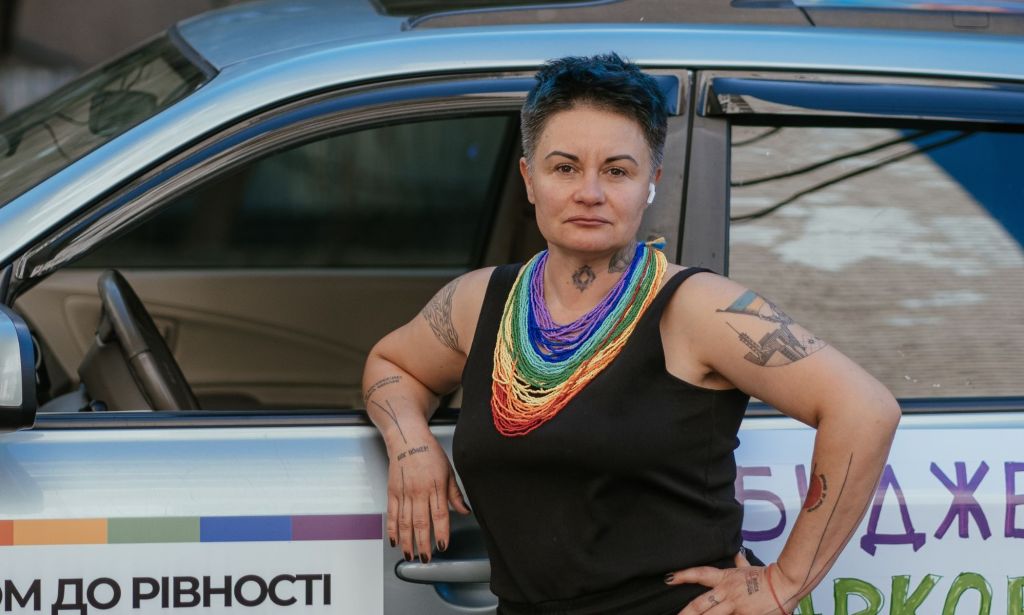Trump campaign launches ad attacking Kamala Harris for supporting trans people’s health care
A new political ad from former President Donald Trump delves deep into transphobia, highlighting Democratic presidential nominee Kamala Harris’ support of providing lifesaving care to transgender inmates (something required by federal law) and showing pictures of her next to a drag queen, a trans woman, and a nonbinary person.
“Kamala is for they/them,” the 30-second ad says. “President Trump is for you.”
The ad primarily accuses Harris of supporting “taxpayer-funded sex-changes for prisoners and illegal aliens” — a crude restatement of her 2019 ACLU questionnaire answer that all federal prisoners, including trans immigrants detained by border agents, deserve medically necessary care, which includes gender-affirming care and surgeries. The Constitution requires U.S. prisons and detainment facilities to provide such care, and courts have upheld this requirement, but some facilities still deny it to inmates.
“It’s hard to believe, but it’s true. Even the liberal media was shocked,” the ad states. To substantiate its claim, the ad shows Harris’ video interview with the National Center for Transgender Equality, in which she declares her support for providing care for trans inmates.
Neither one has anything to do with the federal government’s decades-long obligation to provide essential medical care to all inmates.
The transphobic attack isn’t surprising. Both Trump and his running mate Sen. J.D. Vance (R-OH) have lied about Harris’ running mate, Minnesota Gov. Tim Walz (D), allowing his state’s government to “kidnap children” from unsupportive parents to change their gender. The claim is untrue, as Walz has never signed any such law or order, nor are state officials legally authorized to take trans kids away from unsupportive parents.
Trump has also claimed that schools are conducting surgeries on trans youth without parental consent. This is also a lie. No schools are providing such surgeries, doctors typically refuse to provide such surgeries to minors, and doctors never provide gender-affirming surgery to minors without parental consent.
Furthermore, the Republican National Platform pledges to “keep men out of women’s sports” and cut federal funding for any schools “pushing radical gender ideology” or “inappropriate sexual or political content on our children.”
Chapter 9, Section 5 of the platform promises to “end Left-wing gender insanity,” stating, “We will keep men out of women’s sports, ban Taxpayer funding for sex change surgeries, and stop Taxpayer-funded Schools from promoting gender transition, reverse Biden’s radical rewrite of Title IX Education Regulations, and restore protections for women and girls.”
Down-ticket Republicans are also incorporating transphobia into their political messaging.
One recent TV ad from the National Republican Congressional Committee accuses Democratic Texas state Rep. Vicente Gonzalez of “push[ing] sex changes for kids” even though he told the Texas Tribune that he has “never supported tax dollars paying for gender transition surgeries and never will.”
U.S. Sen. Ted Cruz (R-TX) has also published ads accusing his opponent, U.S. Rep. Colin Allred (D-TX), of being “wrong for our girls,” a reference to Allred’s support of the Equality Act, a federal bill that would add sexual orientation and gender identity to federal anti-discrimination protections.
Allred was a co-sponsor of a resolution to create a “Transgender Bill of Rights to protect and codify the rights of transgender and nonbinary people under the law and ensure their access to medical care, shelter, safety, and economic security,” the Texas Tribune noted.
Allred’s campaign called the ads a “disgusting, false attack, and another example of how Ted Cruz only wants to divide Texans.” Allred and Cruz are polling very closely in a high-profile race that could help determine party control of the Senate.
U.S. Sen. Josh Hawley (R-MO) released an anti-trans ad featuring Riley Gaines, a former competitive collegiate swimmer who launched a career as a spokesperson against trans athletes after she tied for fifth place with trans University of Pennsylvania swimmer Lia Thomas in the 200-yard freestyle at the 2022 NCAA championship.
In the ad, Gaines says that Hawley’s Democratic opponent Lucas Kunce “supports the radical trans agenda” and falsely claims that he supports “sex change operations for minors.” Doctors rarely ever conduct such procedures on minors. Gaines also claims that Kunce supports “boys in girls bathrooms” and “explicit teaching in grade school,” though both are distortions of his support for LGBTQ+-inclusive school policies.
“It’s really disgusting that these politicians think they can use trans people, and more specifically trans youth, as a political tool to win points,” Chase Glenn, the trans male executive director of the Alliance for Full Acceptance, told the Associated Press.
Republican campaigners and polls indicate that transphobia resonates with conservative Christian voters. In fact, the Republican National Platform promises to legally protect Christians who discriminate against LGBTQ+ people.
However, a March 2024 poll showed that 53% of voters oppose candidates who campaign against transgender people. While that might sound like a slim majority, such a majority could help determine which candidates win in close races.
An August 2023 Economist/YouGov poll found that majorities of voters mostly care about inflation, taxes, jobs, the economy, government spending, and immigration.
Subscribe to the LGBTQ Nation newsletter and be the first to know about the latest headlines shaping LGBTQ+ communities worldwide.

